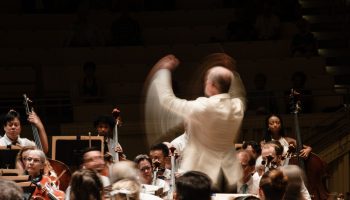
Returning to Chautauqua after two years, internationally performing pianist and School of Music alumni Jonathan Mamora takes the stage at 4 p.m. today in Elizabeth S. Lenna Hall for a universal yet unique program.
Most recently, Mamora won the prestigious 2025 Hilton Head International Piano Competition. He has also garnered top prizes from the Scottish International Piano Competition, Maria Canals International Music Competition and the Olga Kern International Piano Competition.
Mamora will be performing “Piano Sonata No. 2,” by George Walker; “Piano Sonata No. 5,” by Alexander Scriabin; “Adagio in B Minor,” by Wolfgang Amadeus Mozart; and “Piano Sonata in B Minor,” by Franz Liszt.
Walker was the first African American to earn a doctorate at the Eastman School of Music in 1956 and to win a Pulitzer Prize for music in 1996. He’s quite a good composer, Mamora said, but not often played.
“This piece I actually found out was his doctoral dissertation at Eastman, where I went too, to do my doctorate,” Mamora said. “I’m like, ‘Oh, great! Let me highlight something from a fantastic composer.’ ”
Following Walker’s “Sonata No. 2” is a piece contrasting in style and culture, Mamora said. Scriabin described his “Sonata No. 5” as “a big poem for the piano,” which is understandable as it was written at the same time as “The Poem for Ecstasy” — taking the form as both a symphonic and literary poem.
Mozart composed “Adagio” in 1788 when his financial situation was deteriorating slowly. Mozart rarely writes in minor, making this piece sorrowful with its heavier themes; “it’s almost everything that’s best about Mozart,” Mamora said.
Liszt’s “Sonata” not only tackles the expansive battle between good and evil, Mamora said, it’s also incredibly technically demanding — it’s one of the most difficult pieces Mamora has worked on. Additionally, Liszt’s hands were famously large, which is part of what makes his repertoire so virtuosic.
“First of all, it’s technically demanding, but its spirit, identity and philosophy — whichever way you go about it and approach it — is so complex that by the end of it, you’re both physically spent and emotionally spent,” Mamora said. “So it’s kind of like understanding the thing as a whole, but also all of the little magical moments that Liszt raised that helped build up to the end.”
Not the grand ending one might expect from the existential war between good and evil, “Sonata” ends with the softest, lowest B on the piano.
“It ends in silence, really — that’s sort of the weight of it,” Mamora said. “It’s almost as if the entire story is sort of resolved with silence and so maybe that gives everyone a sort of different picture of how it resolves.”
Comfortable with a variety of demands, Mamora grew up playing organ, choir, percussion and piano, but he always thought of piano as having the most different possibilities in colors of sound. To Mamora, a part of playing piano is creating an orchestral sound with an instrument that only has one timbre.
“The trick of it is convincing everyone, including ourselves, that we’re hearing more than one thing. It is actually very possible,” Mamora said. “I think having done choir, orchestra and the organ as well can help expand your musical palate.”
Mamora’s parents enrolled him in piano lessons with the goal of becoming a church musician, solidifying his belief that music truly serves a community.
“Playing in the church really influenced this part of my mission,” Mamora said. “I think regardless of if one person holds a particular faith — be it Christian or whatever — music has power.”
Having heard such inspiring music at a young age, Mamora felt every performance was a chance for connection among the community.
“On any stage you play, whether it’s some crazy concert hall, someone’s home or the Amphitheater in Chautauqua, every moment is an opportunity,” Mamora said. “If you had one person that came up to you and said, ‘This really inspired me,’ or ‘This moved me,’ it’s like, oh that was the case on this horrible piano with these horrible acoustics, and you felt like that. So it had nothing to do with the piano, nothing to do with the room and nothing to do with me. It was the music.”
Music’s deep-rooted influence is clear, particularly through various governments’ attempts to censor it, Mamora pointed out.
“For me, there is the idea of Peter Parker and Uncle Ben, saying, ‘With great power comes great responsibility.’ I have a responsibility not just to do the best that I can with it, but to try to uplift people because music can do that,” Mamora said. “We need to.”
Mamora takes up responsibility in educating, too, and finds that “when you’re teaching, you don’t stop learning.” Students sometimes turn over a piece in a new way, which provides room for freshness and originality.
“I’ve learned from everyone, even my beginning students,” Mamora said. “I’m always learning, so I just hope that it can be an experience, not just for myself, but for everyone — the community, students and whoever may be listening.”




